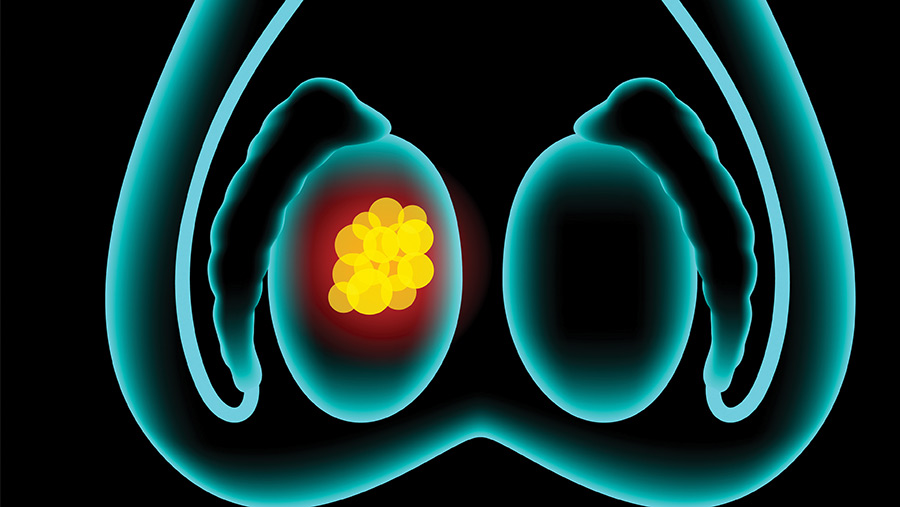Farm Doctor: Let’s talk about prostate and testicular cancer
 © Pikovit/Adobe Stock
© Pikovit/Adobe Stock Handlebars, chevron, walrus, or pencil? Whatever shape of moustache you’re sporting this Movember, it’s a time to ditch the razor and get everyone talking about men’s health.
One of the core aims of Movember is to highlight the mental and physical health concerns affecting men, including certain cancers – more specifically, prostate and testicular cancer.
In June, Farmers Weekly farm doctor Camilla Baker broke down the signs and symptoms of prostate cancer, but in this month’s issue, she’s talking all things testicles.
See also: Farm Doctor: Breaking down barriers to men’s health
“A swelling or lump in the nether regions can be an alarming thing to discover,” Camilla explains.
“There are many different reasons for changes in the scrotum and testicles (testes), however it’s always important to get checked out if you spot something new.”
Testicular cancer is the most common cancer in men between the ages of 15-44, with about 2,000 new cases diagnosed each year.
Of these, around half of all instances occur in men under the age of 35.
Despite this, Camilla says: “Young men are typically less likely to see their doctor or seek help about their health.
“Remember, there is no need to feel awkward or embarrassed, your doctor will have seen it all before!”
What are the signs and symptoms?
The most common symptom of testicular cancer is a new lump or swelling in one of the testes.
“It is important that men get to know their own body so that they notice a change and can get it checked out quickly,” Camilla advises.
“The best time to feel your testes is when you are relaxed, after a shower or bath.
“Roll the testes between your thumb and finger and get to know what is normal.”
Most of the time, there is no particular reason as to why a person may develop testicular cancer, but Camilla says that having a family history can put a person at a higher risk, and it is also more common in white men compared with men from an Asian or African background.
Investigation and diagnosis
If you notice a change or new lump, it is important to visit your doctor for a review.
GPs who are concerned about testicular cancer will refer patients to a specialist for further checks.
This is usually a urologist, a doctor who specialises in problems affecting the testes, penis, bladder and kidneys.
“With suspected cancers, reviews happen urgently, usually within two weeks,” says Camilla.
“They will likely organise an ultrasound scan, which is a painless investigation that can help tell the difference between different types of lumps.
“Your doctor may also organise other investigations such a blood tests.”
While an urgent referral and waiting for results can be a scary time, doctors and nurses understand this, and are there to offer advice and support.
“The only way to be certain that a lump is cancerous is to look at the cells under a microscope.
“To do this, the whole testicle will need to be removed and this is called an orchidectomy,” explains Camilla.
“The whole testicle is removed to ensure all the cancerous cells are taken away. If the other testicle is healthy, removing the affected testicle will not affect your ability to get an erection, make sperm or father children.”
Management
If a diagnosis of testicular cancer is confirmed, further investigations will be done to make sure the cancer has not spread.
Treatment will very much depend on the individual circumstance, but may include surgery, chemotherapy and radiotherapy. Sometimes, surgery alone may be curative, if caught early.
What else could it be?
“The vast majority of swellings or lumps in the scrotum are not due to cancer. This is why it is important to know your testes and what is normal for you,” says Camilla.
Other things that can cause changes in the testes include infection, a build-up of fluid (cyst) or swollen veins (varicocele).
“Most testicular lumps are painless or, at worse, a little uncomfortable.
“If you develop severe, sudden onset pain in a testicle and the pain does not settle after an hour of sitting down or resting, you must seek urgent medical help.
“Severe and sudden onset pain can be a sign of a twisted testes, and this requires urgent medical attention.”
“The most important message is to use Movember as a chance to get to know what’s normal for you.
“If you’re worried about a change or lump, visit your doctor for a review. As with all cancers, the earlier the diagnosis, the better the outcome.”

